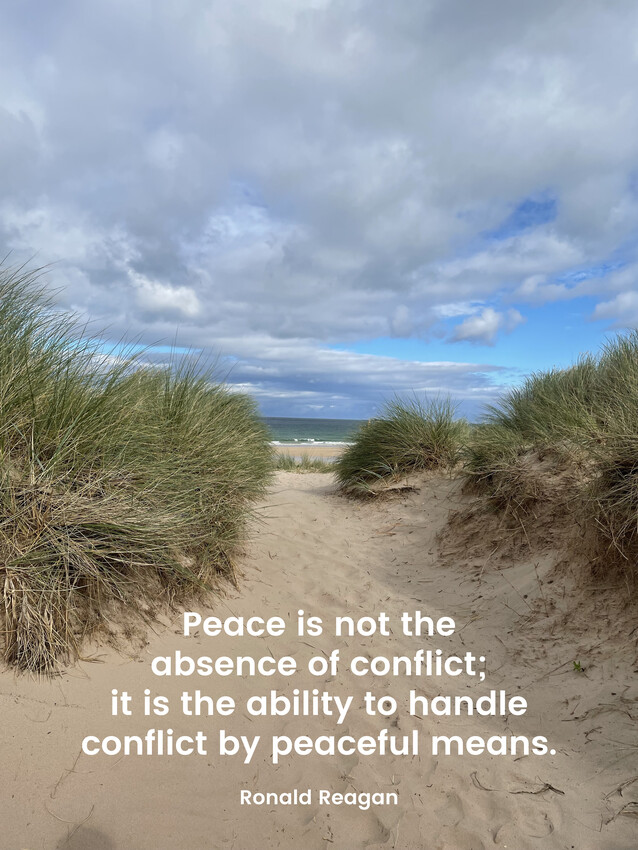What is mediation?
Put simply, mediation is a process where two parties are helped by a third impartial party to communicate and make decisions about issues that affect their future. Mediation can even work in situations where communication has broken down, or where one or both parties have given up hope of ever resolving their differences.
Mediation can also be helpful and appropriate where a relationship between parties is positive but the topics under discussion might be contentious, such as proposals for prenuptial or postnuptial agreements.


Why not just go to court?
In our view, the most compelling reason to try mediation is that two parties can be helped to reach joint decisions about their future for themselves.
Unlike negotiating through solicitors who are duty bound to act only in their client's best interests, mediation encourages collaboration and co-operation with the goal being a 'win-win' rather than 'win-lose' outcome for participants.
Going to court can be a gamble too: the judge takes responsibility for deciding on a legally binding ruling for the two parties, introducing the risk that one or both may be unhappy with the outcome.
Mediation is quicker, cheaper and arguably less stressful than just using solicitors or going to court: all important factors when parties are keen to move forward with their lives as soon as possible.
We should point out too that the Ministry of Justice requires anyone wishing to take their case to family court to have considered mediation first. This means talking your situation through with a qualified mediator and if you decide it is still preferable for you to go to court, obtaining a signed court application form from them.
How is mediation helpful for separated parents?
The Family Courts in England and Wales are keen that wherever possible separated parents make decisions about sharing the care of their children outside of court for themselves. Parents know their children best after all, and agreeing your own arrangements means you can adapt them more easily as your children grow up and their needs change over time.
Recent research into the impact of separation on families has shown that children are not necessarily harmed by having parents in different homes, but their mental health and wellbeing is very negatively affected if there is ongoing unresolved conflict between their parents. This is where mediation can help parents: it provides a 'safe space' to discuss and develop options for cooperative parenting strategies which enable your children to thrive in childhood not overshadowed by parental conflict and to enjoy close, nurturing relationships with each of you.
How do I go about mediation?
This is how mediation works with us:
Step 1
Contact us in any of these ways: via our online enquiry form, via our general email address info@navigatemediation.co.uk , or ring/ email one of us directly using the details listed on our 'Contact Us' page. We will get back to you within 2 working days.
Step 2
When we first make contact we will answer any pressing questions you may have about the mediation process. If you want to consider mediation further, we will book you in for a Mediation Information & Assessment Meeting (otherwise known as a 'MIAM').
Step 3
Your confidential MIAM can take place in person or online and usually lasts around an hour. It's your opportunity to describe your situation and concerns, and for us to explain the process and principles of mediation so that you can decide whether it is the right route for you. We mediators also use this meeting to assess whether mediation appears appropriate for your circumstances at this time. If you wish to proceed and have supplied us with contact details for the other party, we will follow up with them regarding their own confidential MIAM.
Step 4
If both parties and the mediator agree that mediation is appropriate, joint mediation sessions can take place with both parties together or in 'separate spaces'. Joint sessions can be conducted online (using zoom) or held in person; either way the meetings are always voluntary and confidential. We will agree with you in advance whether to schedule the session for 90 minutes or two hours. Simple cases may only require 1-2 joint meetings, more complex ones possibly 4-6.
At the end of each session we will provide you with a brief written statement of decisions agreed upon and issues yet to be resolved. When you are satisfied that the mediation process is complete, we can supply you with detailed documents reflecting your agreements that can, if you wish, be taken to your solicitors to be made legally binding. Some decisions which may benefit from adaptability over time (such as childcare arrangements) may be best left flexible.
Can mediation help me?
Anyone can elect to have a MIAM (Mediation Information and Assessment Meeting) to see whether mediation is likely to be right for them and their circumstances.
The decision to proceed with joint mediation sessions however needs to be agreed collectively by both parties and the mediator.
Mediation is helpful in almost all situations where different perspectives exist, or where difficult topics must be broached and communication needs a helping hand. Clients also sometimes choose to return to mediation later on if they want to discuss changing circumstances.

Here are some examples of where mediation can be highly effective:
Separation/ Divorce
Separating or divorcing couples wanting to sort out child arrangements, property & finance issues, or all of these
Child arrangements
Parents or grandparents who are struggling to agree child arrangements (time spent with the child, shared care schedules, child maintenance payments)
Care of a vulnerable or elderly person
Family, close friends, medical staff or carers needing to come to agreement on care arrangements for a vulnerable or elderly person (the latter is sometimes referred to as 'Elder Mediation')
Prenuptial & postnuptial agreements, wills & inheritance issues
Engaged or married couples wishing to draw up pre or postnuptial agreements to ringfence assets in the event of divorce
Relatives and beneficiaries in dispute over wills and inheritance issues
Workplace conflict
Between employers and employees, or between colleagues
Housing
Landlords and tenants with differing perspectives

